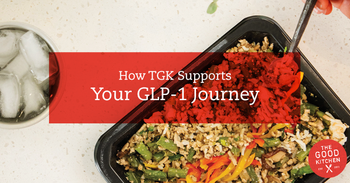Let's Talk About Food Waste: A Problem We Can Solve Together

Saying there’s a lot going on in the world is a massive understatement. A recent pandemic, climate change, social unrest–it can be a lot to deal with. But what if you could help to fix one of these issues running rampant in our society with just being a little more conscious of your eating habits. We’re talking about food waste, or food that is not eaten that amounts to between one-third and one-half of all food produced in the world.
That’s a pretty high ratio, right?
But what’s even more shocking is that in relation to this is the number of people that go hungry every day. According to a report by World Vision, globally, about 8.9% of the world's population — 690 million people — go to bed on an empty stomach each night. Since 2014, the number of people affected by hunger has been slowly on the rise. If it continues at this rate, it'll exceed 840 million by 2030.
It makes you think twice about throwing leftovers away, right? But the point isn’t to feel guilty about being wasteful. It’s about making systematic changes in our activity and our mind when it comes to food. And it’s actually really simple to do.
1. Make Less, Waste Less

In America alone, more than 130 billion pounds of food is wasted a year. That’s valued at roughly $160 billion annually. According to this article in The Atlantic, more than 1,250 calories per person a day, or more than 140 trillion calories a year, get tossed in the garbage, usually without a second thought.
One of the simplest things that anyone and everyone can do is to stop overproducing food. Whether that be stocking up at the grocery store or ordering too much take out only to toss it away the next day in favor of something new. Be conscious about what and how much you’re eating.
Buy and prepare only what you need. By making behavioral changes en masse as a society, we can reduce the demand for commercial food production and cause the need to supply to slow. On top of this, we’ll reduce our own food waste footprint by simply just prepping only what we eat.
No leftovers, no opportunity to waste them.
But what if you don’t cook? We’ll that’s where meal services like TGK come into play. We not only source from local and organic farms to bring healthy, fresh meals right to your doorstep, they are portioned for one, with no opportunity to overprep or waste.
2. Consider Alternative Food Choices

At TGK, we’re advocates for sustainably sourced, farm to table meats like beef, chicken and pork. But those proteins don’t have to be featured in every meal you eat. We also offer some solely vegetarian and vegan options that pack a protein-filled punch.
Why? Because plants are not only great for your health, but they can help to reduce the necessity to rely on meat for every meal.
According to that same Atlantic article: Cattle are responsible for roughly two-thirds of the livestock sector’s greenhouse-gas emissions, while beef and dairy products are responsible for about one-tenth of global emissions overall.
Many leading scholars at Oxford and other top universities agrees that choosing a plant-based alternative to traditional sources of animal protein, particular beef, is one of the best things you could ever do as a consumer for the environment.
You may think: how can me choosing to eat lentils instead of a steak today really help with the food waste epidemic? Well, if every American reduced their consumption of beef by about 40%, it would actually change quite a bit and drastically reduce the amount of annual food waste in our country.
But, like we said, we’re meat lovers here at TGK. We’re not telling you to cut it all out cold turkey...or beef.
In fact, experts encourage taking small, meaningful steps to reduce your meat consumption. Try to make it joyful by integrating it in your daily life as something fun. Participate in Meatless Mondays on social media (we do those over on Instagram), try out learning how to good vegetarian or plant-based dishes for dinner, or try just making your meat the side dish instead of the veggies.
There are lots of ways to still enjoy eating your favorite meats and seafood while being an active force against food waste, especially in America.
Though these 2 things seem simple, they can have a massive impact on the world at large. Think about implementing some of these things in your household and diet. Together we can be a force that changes the world for the better, one meal at a time.






